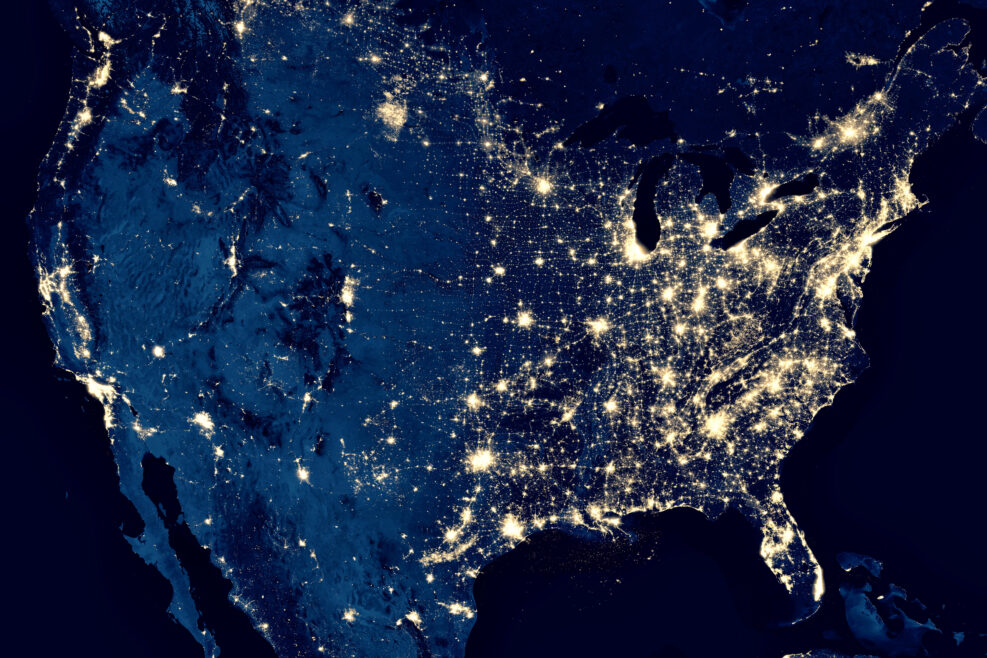
TagChina


Spies and Lies: China’s Cyberespionage Is on an Unprecedented Level
Chinese cybertheft is an ever-increasing threat.
COVID Helped China Get Ahead on Genetic Therapies
Why is China trying to lead the world in genetic technology?
Big Tech and China
Evaluating the technological competition between the two superpowersHow should the United States deal with China? Jay Richards interviews Dr. Bob Kelly, Managing Partner of Ignition Partners, on a panel he was included in. The panel explored the technological competition between the U.S. and China, what it means for the future, and presented differing schools of thought on how the United States should approach China moving forward. We’ve been sharing a number of lectures from past COSM conferences. This video is just one of many you can find at the Bradley Center’s YouTube page. There you’ll find several lectures, interviews, and panels dealing with issues that range from economics, Big Tech, and artificial intelligence. Notable speakers include 2022 Kyoto Prize winner Carver Mead, venture capitalist Peter Thiel, and George Gilder, co-founder of Discovery Read More ›

American Prometheus: Destroyer of Worlds
Christopher Nolan's "Oppenheimer" meets the hype and illustrates just how world-changing the atomic bomb was“Now I am become Death, the destroyer of worlds.” So goes a line from the Hindu sacred text Bhagavad Gita, quoted by none other than J. Robert Oppenheimer, the quantum physicist who headed up the development of the first atomic bomb during World War II. Christopher Nolan’s new film Oppenheimer hit theaters on July 21 and has given audiences a taste of why the “father of the atomic bomb” entertained that haunting, little phrase. Nolan hit this movie out of the park. With a star-studded cast, a juxtaposed and non-linear storytelling mode, and a beautiful soundtrack to boot, some critics are calling it the most important movie of the century. That might be because the production of the atom bomb Read More ›

TikTok is Storing Data in China, Contrary to Former Claims
TikTok CEO said user data isn't stored in China. Turns out it is.Many online creators and entrepreneurs give sensitive data to TikTok, the China-owned social media app, so they can do business on the platform. That includes social security numbers. TikTok CEO Shou Zi Chew told Congress earlier this year that users’ data was stored outside of China in places such as Virginia and Singapore. Apparently, however, that is an inaccurate claim. According to a report from Forbes, TikTok has indeed been storing sensitive data on Chinese servers, where employees there can access it. Alexandra S. Levine reports, A trove of records obtained by Forbes from multiple sources across different parts of the company reveals that highly sensitive financial and personal information about those prized users and third parties has been stored in China. Read More ›

TikToxic: The Popular App is Feeding Teens a “Diet of Darkness”
Apart from the debate over espionage and data privacy, TikTok is a highly addictive appTikTok has gained a fair bit of fierce criticism over the last few months; the China-owned social media app is the most popular on the market, with tens of millions of users and downloads. That includes, of course, teenagers. Apart from the debate over espionage and data privacy, TikTok is a highly addictive app. We covered more on that here, but recent studies show that it’s not just the amount of time spent on the app that is troubling, but the specific kinds of content young people are ingesting every day. Julie Jargon writes in the Wall Street Journal, Data privacy, though, might be less worrisome than the power of TikTok’s algorithm. Especially if you’re a parent. A recent study found that Read More ›

The Clock’s Ticking for TikTok
Biden admin might ban TikTok in the U.S. if company doesn't sellThe Biden administration is considering banning TikTok in the United States if the platform’s parent company, ByteDance, doesn’t sell it. The news arrives amidst growing concerns over national security and Chinese espionage tactics, particularly in light of the “spy balloon” that was shot down off the American east coast in February. ByteDance is a Chinese company, and as such, is subject to disclose its information to the Chinese Communist Party. Today, more than half of American states have placed bans on state-issued devices out of privacy and security concerns. Texas representative Paul Michael McCaul said, TikTok is a modern-day Trojan horse of the [Chinese Communist Party], used to surveil and exploit Americans’ personal information. It’s a spy baloon for your Read More ›

The Chinese Spy Balloon Saga, Part 2
China continues to deny that the balloon was used for spying on military basesThe U.S. has shot down four aerial objects this month, one of which was a Chinese surveillance balloon that had traversed the U.S. from Idaho to the Atlantic Ocean. Part 1 of Mind Matters Spy Balloon Saga provides an overview of the four aerial objects that were shot down. Since then, several media outlets found additional information on China’s global high-altitude balloon program, including that the balloon shot down in the Atlantic likely launched from Hainan Island and was intended to surveil U.S. Pacific military bases in Guam and Hawaii. The balloon inadvertently traversed into the continental U.S. Here is a rundown of what of several media outlets have reported: There are 2 known launch sites in China: Dorbod Banner Read More ›

The Chinese Spy Balloon Saga (Part 1)
China may be playing a psychological game with the United StatesOn February 4, the U.S. shot down a Chinese high-altitude surveillance balloon over the Atlantic Ocean off the coast of South Carolina. The balloon was first spotted on January 28 over the Aleutian Islands, and then traveled over Alaska, through Canada, and then into Idaho. Chinese spokespersons maintained that it was a meteorological research balloon that had veered off-course. However, recovery crews confirmed that the balloon platform was equipped with communication surveillance and interception tools. Since then, three other aerial objects, all flown within the vicinity of sensitive U.S. military sites, have been shot down. The other three are not confirmed to be of Chinese origin and have not been identified as surveillance balloons. NORAD (North American Aerospace Defense Command) Read More ›

China Balloons, EMP’s and Bioweapons: A Chilling Possibility
One nuclear burst 250 miles above Kansas could damage most of the power gridNo one has mentioned that the China balloon recently shot down after sailing across the United States could have been weaponized with a bomb or bioweapons. Thankfully, it was not. A single nuclear burst 250 miles above Kansas could destabilize much if not most of the US power grid. Almost the entire country, as well as parts of Mexico and Canada, would be affected by the resulting EMP (electromagnetic pulse). 250 miles above the Earth is about as high as the US Space Station is from Earth. Potential military threats from outer space was a prime motivation for creating the United States Space Force in 2019. The China balloon was not 250 miles up required for a coast-to-coast EMP Read More ›

No More TikTok for State Agencies in Texas
Tenuous US-China relations may prompt other state legislatures to follow in Abbott’s footstepsGovernor Greg Abbott of Texas called for a ban of TikTok from all state agencies this week. Agencies have until February 15th to accommodate to the policy, which entails removing the social media app from all devices used to carry out official Texas-related business. The new ruling will also involve restricting access to TikTok usage on personal devices in potentially “sensitive locations and meetings.” TikTok, owned by the Chinese company ByteDance, Ltd., has been criticized for mining data from its American users. Since the Chinese government can demand data disclosures from businesses, Gov. Abbott thinks TikTok is an issue of state and national security: TikTok harvests significant amounts of data from a user’s device, including details about a user’s internet Read More ›

War With China: Who Will Win?
Has the United States lost its status of military superiority?General Mike Minihan, head of Air Mobility Command and 50,000 US service members, said, “I hope I am wrong. My gut tells me we will fight [China] in 2025.” China’s invasion of Taiwan might spark this war. Predictably, the politically obedient Department of Defense (DOD) responded “comments [by Minihan] are not representative of the department’s view on China.” “Views” can be unimportant. Whether or not General Minihan is correct is important. Who would win the war between the US and China? Many are pessimistic about the chances of the United States being the victor. Here are short summaries (with links) of a few disturbing opinions from those who should know. So, how is the US doing? Here are some disturbing Read More ›

China Leads the World in Face Recognition Exports
The global power is exporting the AI to weak and autocratic countries, according to a report from Brookings InstituteChina is the world’s leading exporter of facial recognition technology, according to a study conducted by researchers from Harvard and MIT. The study aimed to elucidate the ramifications of the AI revolution and what it means for such technology to be exported from a global power like China. They found that China is more likely than other countries to export AI technology to other countries. China also focuses on exporting facial recognition to countries with weak democracies that are experiencing social unrest and upheaval. Political motivation might be driving such trades. The authors write, The Chinese government’s demand for surveillance and political control translates into more exports of AI. Moreover, our finding that autocrats and would-be autocrats abroad demand surveillance Read More ›

China: Protesters Evade Censors and Confront State Surveillance
Chinese citizens are known for their clever plays on words to evade social media censors.The graffiti on the bathroom wall at the university said there would be a gathering in honor of the people who had died in an apartment fire in Urumqi, Xinjiang. Bathrooms usually do not have surveillance cameras, so this announcement would probably go unnoticed by censors. It is better than risking punishment by posting on social media. In another city, Chinese citizens discretely shared information about the location of a vigil for the Urumqi victims on WeChat in the guise of dinner plans. A number of people died in the fire, whose toll was likely inflated because emergency vehicles were unable to access the building due to zero-Covid measures. Social media posts showed doors that were barred shut and barricades Read More ›

Are Electric Cars Really the Future?
Panelists at the 2022 COSM conference discuss the pros and cons of electric vehiclesOn November 10th, the COSM conference hosted a special panel on electric vehicles (EVs for short). Brian Mistele, founder and CEO of Inrix, a leading provider of traffic information, car services, and transportation analytics, moderated the discussion. Aside from Mistele, the panel included Howard Hayden, professor emeritus at the University of Connecticut and editor of The Energy Advocate, Walter Myers, Principal Manager on Azure, Microsoft’s cloud-based platform, and Tony Posawatz, an automotive industry pioneer and chief executive of Fisker Automotive. They brought a range of perspectives on the pros and cons of EVs and where the auto industry is heading. Posawatz kicked off the panel by giving a brief overview of automobile history. He said, There was electric and folks Read More ›

What Difference Has the CHIPS Act Made to the U.S. and Taiwan?
We need to first look at the broader picture of what the CHIPS Act is intended to doIn a previous article, I discussed the semiconductor industry and Taiwan’s supremacy in manufacturing microchips, the foundry portion of the semiconductor supply chain. Now let’s look at the U.S. perspective on the semiconductor industry and its relationship to Taiwan. In order to do that, we have to talk about the CHIPS+ Act Congress passed a bipartisan bill, the CHIPS and Science Act in July, after a year of negotiations in committee. President Biden signed the act into law on August 9 and the CHIPS Act Implementation Strategy was launched on September 6 through an executive order. CHIPS, or “Creating Helpful Incentives to Produce Semiconductors,” is a $250B initiative that incentivizes businesses to bring semiconductor manufacturing, research and innovation back to Read More ›

How Safe Is Our Tech If It Depends on Non-Free Nations?
Europe’s energy woes, in the wake of the Russia–Ukraine war, should spur us to take the question seriouslyKeith Krach, former chairman and CEO of Docusign, the app that enables you to conveniently buy a house in Delaware while selling one in Oregon, is speaking at COSM (November 9–11 in Seattle). Docusign was of immense help during the COVID pandemic when in-person transactions were often impractical, illegal, or just impossible. Go here to get the Early Adopter rate before September 15. Krach, former Under Secretary of State and current Chairman of the Krach Institute for Tech Diplomacy at Purdue University, has been thinking a good deal about our future and new technology. He is committed to the importance of rehoming technology Americans need in the United States, as he told Fierce Electronics recently: Our adversaries, starting with the Read More ›

Largest Data Grab Ever Stole Shanghai’s Mass State Surveillance
The police, dutiful in monitoring everyone, flunked data security. Now it’s all for sale on the Dark WebBeijing wants to create a centralized database with personal information on everyone living in China. To do that, the government saves massive amounts of data acquired through surveillance technologies such facial and voice recognition and cell phone monitoring. In a previous article, we saw that the Chinese government’s surveillance network is much more extensive than once thought. However, while the Chinese government has prioritized collecting massive amounts of data, it has not prioritized protecting it. Thus, a hacker has acquired police data files on 1 billion Chinese residents (approximately 23 terabytes of data) from the Shanghai National Police database. The files include name, national ID number, cell phone number, birthdate, birthplace, ethnicity, education level, marital status, and delivery records. They Read More ›

AI: The Potential and the Problems
Despite the hype regarding the seemingly infinite possibilities surrounding AI technology, artificial intelligence still has a number of humbling hurtles to overcome. Justin Bui and Samuel Haug join Robert J. Marks to discuss the latest developments in artificial intelligence. Show Notes 00:00:56 | The Homunculus 00:04:09 | Introducing Justin Bui 00:06:54 | Fast AI 00:13:45 | Deepfake Technology 00:21:40 | Read More ›